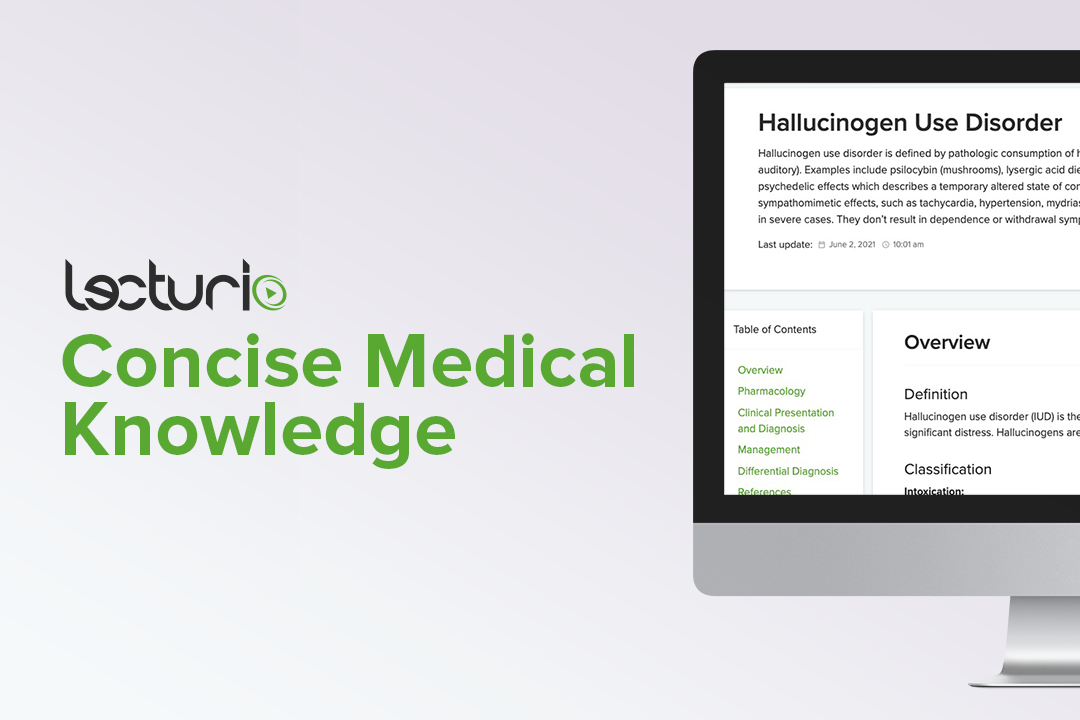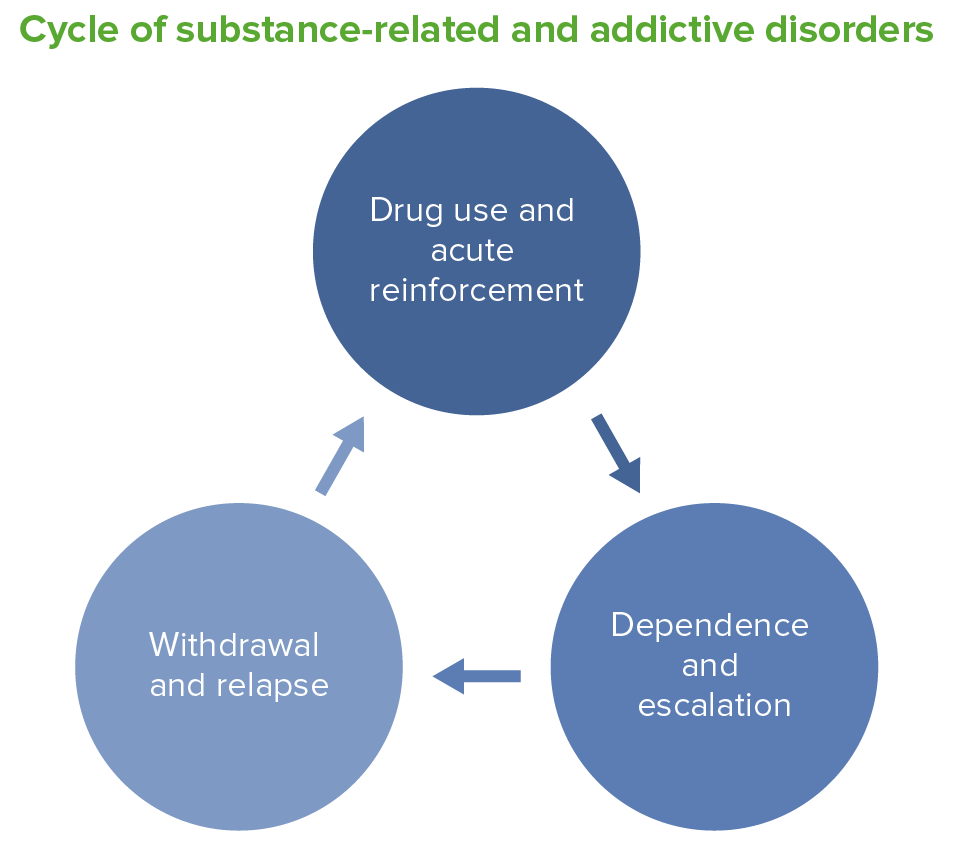Playlist
Show Playlist
Hide Playlist
Consciousness Altering Drugs: Stimulants and Hallucinogen – Consciousness (PSY)
-
Slides Consciousness Altering Drugs.pdf
-
Download Lecture Overview
00:01 So let’s get into what we’re talking about when we’re talking about dependence and addiction. 00:05 So another class that we’re going to talk about are the psychostimulants, and like the name implies, we’ll break that term down: psycho, stimulant. 00:13 Psycho refers to sort of psychological disposition or your mind and stimulant, stimulatory. 00:18 So what’s it doing is actually activating your brain. 00:22 So some examples would be caffeine, which you’d find in coffee or pop and different beverages. 00:27 You have nicotine, which comes from cigarettes. 00:29 Cocaine, from your local neighborhood cocaine dealer, and amphetamines. 00:34 Okay. So a whole bunch of different things, all fall under the class of stimulants because of their stimulant properties. 00:41 Now, what these do are increasing the release of those neurotransmitters that we had mentioned before. 00:48 So these are chemical messengers in your brain, and when you take these stimulants or actually increasing amounts of it and these are the stimulatory type. 00:57 And what that ends up doing is it ends up causing an exaggerated reaction that you would have versus when you were not taking any of these stimulants. 01:05 So when you do take a stimulant, it can have the effects of speeding up bodily functions, increasing your energy, increasing your heart rate. 01:12 It does a lot of different things. 01:14 Another really, really key thing that it does that a lot of people end up using this drug for is that it increases alertness and arousal. 01:20 So when you wake up after a full night of studying for your MCAT and you roll out of bed, you kind of roll over and hit on on your coffee machine because you need that java, that caffeine to stimulate and get yourself going. 01:33 Okay? Now, another thing to be cognizant of about is the fact that when you take these stimulants, you’re increasing artificially and temporarily the neural activity in your brain and the levels of neurotransmitter in your brain, this is at some point going to come back down and we have something called rebound depression. 01:51 And what that means is for every high, you’ll have a resultant opposite low. 01:56 Okay? So if you take coffee -- caffeine and if you have your coffee, you feel great for that hour or so and you’re getting into work and you’re doing your thing and you’re saying, “I had that morning coffee and I’m ready to go.” But then what happens around 10:00, 10:30 when you’re at the office? You’re really, really tired, which is why you have that kind of 10:30 coffee break, right? And so, these highs and lows are related to the highs that you see and the rebound depression that’s resulting after that. 02:20 Stimulant properties start to go away. 02:25 Psychedelics or hallucinogens, this is the category that includes things like LSD and marijuana. 02:32 So they might seem almost two different complete different agents, but they still fall under that psychedelic drug category, and we’ll look at sort of a bit of each. 02:40 And LSD was a drug that was really, really popular, also known as acid, in, you know, the ‘50s and ‘60s. 02:47 And what you would do there is you would take a small little piece of paper or a stamp that had been dipped in LSD and you put it on your tongue, it dissolves, and very quickly, you have this out-of-body experience or we say alters and distorts your perceptions in the absence of any sensory input. 03:04 So in English, that means you take this LSD and you’re standing there and you think you’re seeing these beautiful lights and you look at your hand and everything looks magical. 03:13 And that’s really not because there’s a magical flying unicorns and you’re seeing these crazy colors. 03:19 That’s just your mind, I don’t want to say playing tricks, but your mind is sensing things that actually aren’t being presented to you from the outside world. 03:28 So marijuana is a very common drug and the active ingredient in marijuana is called THC or tetrahydrocannabinol. 03:34 This is a compound that actually activates the cannabinoid receptors in the brain and these are found all over your body. 03:43 And they have a very dramatic effect, a very relaxing effect. 03:47 If taken in enough quantities, it can have a psychedelic effect and they have a lot of actual medicinal uses, as well, which is why marijuana is a unique drug and that it falls on that fringe of being something that can potentially be used for therapeutic or medicinal uses, but it’s obviously also used for recreational uses. 04:06 So this is ongoing debate. 04:08 In a lot of countries, it is legalized. 04:11 In other countries, it’s still considered an illegal substance and those country users that debate of, “But wait a second, I’m using it for pain or nausea and I’m not using it to get high and have fun with my friends.” But, you can see that there are applications for both.
About the Lecture
The lecture Consciousness Altering Drugs: Stimulants and Hallucinogen – Consciousness (PSY) by Tarry Ahuja, PhD is from the course Making Sense of the Environment. It contains the following chapters:
- Consciousness Altering Drugs - Stimulants
- Consciousness Altering Drugs - Hallucinogen
Included Quiz Questions
Anne drinks a large cup of black coffee every day. One morning, she forgets to drink coffee, and she feels extremely tired and mellow. What explains this phenomenon?
- Caffeine withdrawal
- Flashback
- Rebound stimulation
- Tolerance
- Rebound depression
Methamphetamine affects the central nervous system by increasing neurotransmitter release. Which substance has a similar mechanism of action?
- Nicotine
- Alcohol
- Phencyclidine
- Heroin
- Marijuana
Drew sees a discussion about a drug that alters and distorts perception in the absence of any sensory input. What is the active ingredient in this drug?
- Tetrahydrocannabinol
- 6-monoacetylmorphine
- Diphenhydramine
- Benzylpiperidine
- Dextromethorphan
Customer reviews
5,0 of 5 stars
| 5 Stars |
|
5 |
| 4 Stars |
|
0 |
| 3 Stars |
|
0 |
| 2 Stars |
|
0 |
| 1 Star |
|
0 |





